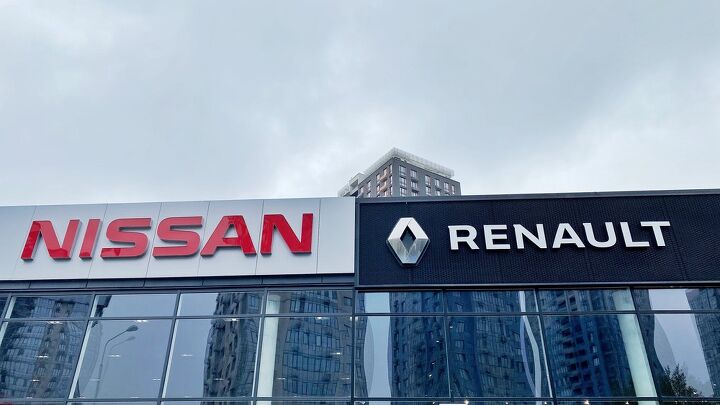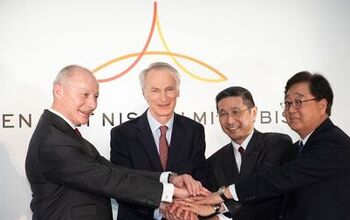Renault–Nissan–Mitsubishi Alliance Being Overhauled

The strategic partnership between France’s Renault and Japan’s Nissan has been a tenuous alliance throughout most of its history. However, the duo is attempting – once again – to tweak the nature of their complicated relationship in the hopes it produces better cooperation and reduced animosity.
While the stated goal was to increase economies of scale for both brands without either having to lose their autonomy, many noted that Nissan was in rough shape by 1999 and was running out of options. This laid the groundwork for nearly two decades of clandestine infighting between management and foreshadowed the scandal surrounding Carlos Ghosn – who became the CEO of both companies, often being credited as the man who saved Nissan – and several other high-ranking executives.
In May of 1999, Renault purchased a 36.8-percent stake in Nissan. This effectively saved the Japanese company’s bacon but the following years resulted in a comeback story to be envied. Nissan was quickly in a position to repay the French brand by purchasing a 15-percent stake and became the larger brand due to its sizable volume in Asia and North America. It wasn’t long before Nissan staffers were asking themselves why Renault, and thereby the French government (being the automaker’s largest shareholder), had voting rights they lacked. After all, Nissan was the larger company, and the size gap only appeared to be widening.
Renault’s influence became a source of resentment among many Nissan executives and a sizable contingent of its workforce. Japan is a country that’s pretty serious about its culture and has historically gone out of its way to protect or isolate itself from outside influence when it doesn’t appear to offer a tangible advantage. Meanwhile, the French government was seeking to expand its own influence over Renault by increasing its stake. This rubbed both companies the wrong way and resulted in a short-lived and semi-unified opposition to state influence.
While there’s certainly a lot we’re not covering, the important thing to remember is that neither company was doing all that well by 2018. However, Nissan (which had purchased a controlling stake in Mitsubishi two years earlier) had further to fall now that its booming volume had started to decline. Corporate infighting had likewise resumed and there was a surprise announcement in November that CEO Carlos Ghosn (who chaired the alliance) had been detained by Japanese authorities.
This was the tipping point.
Suspicions abounded. Many claimed this was an industrial coup, with there being a wealth of evidence to support those claims. Numerous high-ranking executives were likewise implicated in some of the financial crimes Ghosn was likewise being accused of. Ghosn had made a lot of enemies and defied Japanese tradition by snubbing promotional schemes based on seniority. He was more willing to hire outsiders into high-level positions and made a surplus of enemies as a result. While imprisoned, he alleged that these things had ensured he would not get a fair trial in Japan due to plans that he sought to further integrate Renault and Nissan. He likewise cited constantly evolving charges and a lack of cooperation from Japanese authorities.
With bail being repeatedly rejected and new claims from Renault and the French government that some of Ghosn’s money may not have been acquired legally, the man was smuggled out of the country and into Lebanon where he now lives as a fugitive.
The recent announcement that the companies have been reconsidering the relationship has been a long time coming. There have been numerous attempts to rejigger the partnership into something a bit more amicable. But it’s frequently been undermined by competing agendas. Under the revised agreement, both automakers will hold a 15-percent stake in the other. Additionally, they’ll have to match investments into Latin America, India, and Europe – regardless of which brand is more dominant in those markets. Nissan is also supposed to be investing a meaningful amount of itself into Renault’s EV and software startup Ampere.
The companies have released a joint statement acknowledging the changes. But nothing has been set in stone just yet. As things currently stand, they’ve only agreed on a basic framework for re-balancing their relationship. Finalization of the deal is expected anytime now. But there is a chance that things could still fall apart.
Renault arguably has the most to lose here. The company is reducing its stake to improve the relationship and will transfer 28.4 percent of its stake to a French trust, neutralizing its voting rights in most instances. While it can still profit from the sale of those shares, its influence over Nissan has been scaled back immensely. Meanwhile, Nissan and Mitsubishi will be getting access to Renault's new EV tech and will presumably see more autonomy than it has in years. There’s also supposed to be collaboration on numerous programs focusing on market penetration and some jointly developed vehicles.
The agreement is expected to see board approval with a formal announcement rumored to take place by February 6th.
[Image: Yuliia Lisiana/Shutterstock]
Become a TTAC insider. Get the latest news, features, TTAC takes, and everything else that gets to the truth about cars first by subscribing to our newsletter.

A staunch consumer advocate tracking industry trends and regulation. Before joining TTAC, Matt spent a decade working for marketing and research firms based in NYC. Clients included several of the world’s largest automakers, global tire brands, and aftermarket part suppliers. Dissatisfied with the corporate world and resentful of having to wear suits everyday, he pivoted to writing about cars. Since then, that man has become an ardent supporter of the right-to-repair movement, been interviewed on the auto industry by national radio broadcasts, driven more rental cars than anyone ever should, participated in amateur rallying events, and received the requisite minimum training as sanctioned by the SCCA. Handy with a wrench, Matt grew up surrounded by Detroit auto workers and managed to get a pizza delivery job before he was legally eligible. He later found himself driving box trucks through Manhattan, guaranteeing future sympathy for actual truckers. He continues to conduct research pertaining to the automotive sector as an independent contractor and has since moved back to his native Michigan, closer to where the cars are born. A contrarian, Matt claims to prefer understeer — stating that front and all-wheel drive vehicles cater best to his driving style.
More by Matt Posky
Latest Car Reviews
Read moreLatest Product Reviews
Read moreRecent Comments
- Theflyersfan With sedans, especially, I wonder how many of those sales are to rental fleets. With the exception of the Civic and Accord, there are still rows of sedans mixed in with the RAV4s at every airport rental lot. I doubt the breakdown in sales is publicly published, so who knows... GM isn't out of the sedan business - Cadillac exists and I can't believe I'm typing this but they are actually decent - and I think they are making a huge mistake, especially if there's an extended oil price hike (cough...Iran...cough) and people want smaller and hybrids. But if one is only tied to the quarterly shareholder reports and not trends and the big picture, bad decisions like this get made.
- Wjtinfwb Not proud of what Stellantis is rolling out?
- Wjtinfwb Absolutely. But not incredibly high-tech, AWD, mega performance sedans with amazing styling and outrageous price tags. GM needs a new Impala and LeSabre. 6 passenger, comfortable, conservative, dead nuts reliable and inexpensive enough for a family guy making 70k a year or less to be able to afford. Ford should bring back the Fusion, modernized, maybe a bit bigger and give us that Hybrid option again. An updated Taurus, harkening back to the Gen 1 and updated version that easily hold 6, offer a huge trunk, elevated handling and ride and modest power that offers great fuel economy. Like the GM have a version that a working mom can afford. The last decade car makers have focused on building cars that American's want, but eliminated what they need. When a Ford Escape of Chevy Blazer can be optioned up to 50k, you've lost the plot.
- Willie If both nations were actually free market economies I would be totally opposed. The US is closer to being one, but China does a lot to prop up the sectors they want to dominate allowing them to sell WAY below cost, functionally dumping their goods in our market to destroy competition. I have seen this in my area recently with shrimp farmed by Chinese comglomerates being sold super cheap to push local producers (who have to live at US prices and obey US laws) out of business.China also has VERY lax safety and environmental laws which reduce costs greatly. It isn't an equal playing field, they don't play fair.
- Willie ~300,000 Camrys and ~200,000 Accords say there is still a market. My wife has a Camry and we have no desire for a payment on something that has worse fuel economy.


































Comments
Join the conversation
They keep using the word “alliance” for this mash-up. So as usual, I ask: what will they do for an encore?! (Maybe heater cores that don’t explode, bathing the front passenger’s legs in hot coolant, would be a start!)
I don't understand how Mitsubishi is still hanging on. They have like 3 models.